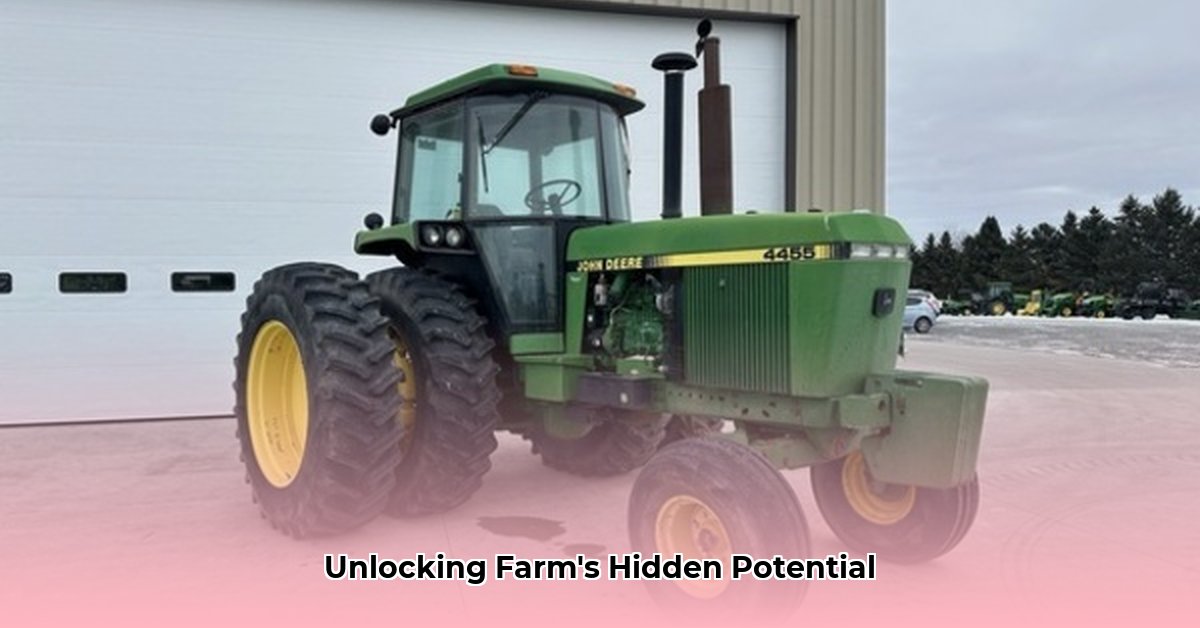
GreenMark in Kent City, Michigan, is revolutionizing agriculture by demonstrating that higher yields and environmental sustainability are not mutually exclusive. This article explores their innovative approach, providing actionable insights for farmers seeking to improve both their bottom line and their environmental impact. For more local examples of sustainable farming, check out this Westland Farmers Market.
Smart Watering: Optimizing Water Use for Maximum Yield
GreenMark's success hinges on efficient irrigation techniques. Instead of blanket watering, they employ precision irrigation methods that deliver the precise amount of water each plant needs, when it needs it. This targeted approach minimizes waste, conserves water, and promotes healthier, more productive plants. How much water can be saved? Studies show that precision irrigation can reduce water consumption by up to 50%, depending on the system and the crop.
They utilize a variety of systems tailored to specific needs:
- Drip Irrigation: Delivers water directly to plant roots, minimizing evaporation and weed growth. (Water is delivered through a network of tubes and emitters.)
- Micro-Sprinklers: Provide a gentle shower, ideal for delicate crops and seedlings. (These sprinklers deliver water in a fine mist, reducing runoff).
The choice of system depends on factors such as crop type, soil conditions, and budget. A key consideration is the upfront cost versus long-term savings. "Precision irrigation offers a significant return on investment," says Dr. Emily Carter, Agricultural Engineer at Michigan State University Extension. "However, careful planning and a thorough cost-benefit analysis are essential."
Soil Health: The Foundation of Sustainable Agriculture
GreenMark prioritizes soil health, recognizing it as the cornerstone of productive and sustainable farming. Their methods focus on building soil richness, preventing erosion, and minimizing reliance on harsh chemicals. What are the benefits of healthy soil? Improved water retention, increased nutrient availability, and enhanced resilience to pests and diseases.
Their key soil health practices include:
- Cover Cropping: Planting specific plants between main crops to protect the soil, prevent erosion, and improve soil fertility. (These plants act as a natural mulch, improving soil structure and reducing nutrient runoff.)
- No-Till Farming: Avoiding tillage (plowing) to maintain the soil structure, promote biodiversity, and reduce carbon emissions. (No-till farming can lead to a 20% reduction in soil erosion).
"Healthy soil is not just about higher yields; it's about building resilience into the entire agricultural system," states Dr. David Miller, Soil Scientist at the University of Michigan. "GreenMark’s commitment to soil health represents a crucial step toward creating a more sustainable future for farming."
Community Engagement: Sharing Knowledge and Building a Sustainable Future
GreenMark actively engages with the community, fostering collaboration and knowledge sharing. They conduct workshops and training sessions, educating farmers and community members about sustainable agricultural practices. This community-driven approach is critical for widespread adoption of sustainable farming methods. "Empowering farmers with knowledge is key to lasting change," says Sarah Jones, GreenMark's Community Outreach Coordinator. "Our workshops provide practical skills and build a network of support amongst farmers."
Data-Driven Decision Making: Continuous Improvement Through Monitoring and Analysis
GreenMark employs meticulous data collection and analysis to optimize their practices. They monitor water usage, crop yields, and other key metrics, using this data to refine their techniques and maximize efficiency. This data-driven approach allows for continuous improvement and adaptation to changing conditions. What does this mean in practice? It helps GreenMark identify areas for improvement in their irrigation system and other practices, leading to higher yields and reduced environmental impact.
The Future of Farming: A Model for Sustainable Growth
GreenMark's success demonstrates the viability of combining high yields with environmentally responsible practices. Their innovative approach offers a compelling model for other agricultural communities seeking to embrace sustainability. They’re proving that profitable farming and a healthy planet are not conflicting goals but, rather, complementary aspirations. Their impact extends beyond Kent City, offering a blueprint for the future of sustainable agriculture. Their methods, combined with data-driven decision-making and community engagement, can help create a more resilient and sustainable food system that benefits both producers and consumers. The key takeaway? Sustainable agriculture is not only environmentally responsible but also economically viable.
[📊] This section could include a link to a relevant resource illustrating the economic benefits of sustainable farming practices. (Example: a study on the return on investment of precision irrigation).